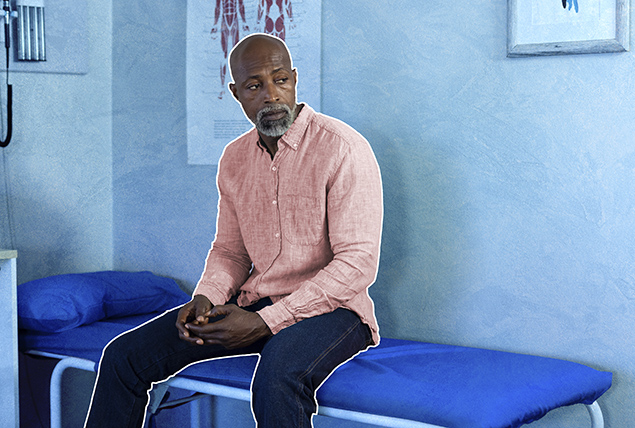Black Men Have a Higher Risk of Prostate Cancer at Any PSA Level

Key Points
- The average risk of prostate cancer is about 1 in 8 for men of all racial and ethnic groups. For Black men, it's 1 in 6.
- PSA screening is one of the primary prostate cancer tests. When detected early, the condition is curable with radiation therapy and other treatments.
- A new study indicates Black men are more likely to have prostate cancer than white men even when their PSA levels are equal, suggesting Black men may benefit from earlier and more frequent screening.
People with prostate cancer typically have higher levels of prostate-specific antigen (PSA) in their blood. PSA screening can help to detect prostate cancer in its early stages, reducing the risk of advanced disease and death.
However, new research indicates Black men are more likely than white men to have prostate cancer, even when their PSA levels are the same or lower.
These new findings suggest Black men may need to start PSA screening earlier and have more frequent tests than their peers.
Are Black men more likely to develop prostate cancer?
Black men have an increased risk of prostate cancer compared to white, Asian, Latino and Hispanic men, according to the American Cancer Society (ACS). They're also more likely to be diagnosed at an advanced stage and with more aggressive forms of the disease.
Moreover, Black men are more likely to die of prostate cancer and to develop it at a younger age, according to the ACS and new research published in the World Journal of Men's Health.
Researchers set out to find if Black men could benefit from distinct PSA screening protocols based on their increased risk of prostate cancer, according to a study published in November 2023 in Cancer, a journal of the ACS.
Noncancerous and cancerous cells in the prostate gland produce prostate-specific antigens. They're primarily found in semen, but some circulate in the blood, with the level measured as nanograms per milliliter (ng/mL).
As the level rises, so does the risk of prostate cancer. Generally, men with prostate cancer have PSA levels of 4 ng/mL or higher, though that's not always the case, per the ACS.
Many men with a level of 4 ng/dL or higher don't have cancer, and about 15 percent of men with lesser levels do. About 25 percent of men with levels between 4 and 10, and 50 percent with levels higher than 10 have prostate cancer.
"It's important to note that most urologists consider the change in PSA—and specifically the rise in PSA over time—to be a greater indicator of the possibility of prostate cancer than that of a single PSA blood test alone," said Christopher Hartman, M.D., the chief of urology at Northwell Long Island Jewish Forest Hills in New York City.
"That's why regular PSA screenings are essential," said Aurelie Garant, M.D., an assistant professor of radiation oncology with UT Southwestern's Simmons Cancer Center in Dallas. "PSA levels tend to rise with age as the prostate gets bigger. But if a doctor detects the number is trending upward beyond what's expected, they can monitor more closely and administer additional tests, if needed."
Seeing upward trends is what increases the chances of detecting prostate cancer in its early stages when it's curable.
Recommended
- How Are Ejaculation and Prostate Cancer Connected?: Research suggests frequent release can lower a man's chances of developing the disease.
- Can I Live a Normal Life—and Enjoy Sex—Without a Prostate?: Learn what patients and their partners can expect following a radical prostatectomy.
- Please Stop Believing These Prostate Cancer Inaccuracies: There is a lot of information about prostate cancer. Don't believe everything you read.
In the 2023 study, researchers examined data from 75,295 Black veterans and 207,658 non-Hispanic white veterans to see if the risk of prostate cancer was higher than expected in Black men based on their pre-biopsy PSA levels.
After accounting for various factors, the investigators determined Black veterans were 50 percent more likely to be diagnosed with prostate cancer based on their first biopsy. Moreover, 55 percent of Black men and 43 percent of non-Hispanic white men with a PSA level of 4 ng/dL received a prostate cancer diagnosis during the biopsy.
The researchers concluded that, for Black men, a PSA level of 4 carries the same risk as that of 13.4 for white men. The findings indicated that at any PSA level, Black men have a higher risk of prostate cancer than their white counterparts, the study authors wrote.
Researchers added that more prospective studies are needed to evaluate the benefits and risks of PSA screening in high-risk populations. However, the data suggests clinicians should consider race when deciding when and how often individual patients should undergo prostate cancer screening, said first author Kyung Min Lee, Ph.D., of the U.S. Department of Veterans Affairs Informatics and Computing Infrastructure in Salt Lake City, in a 2023 press release.
"I think that this study was well conducted and supports ongoing recommendations to offer PSA-based screening to younger Black men," Garant said. "However, there are some additional socioeconomic determinants of health, which were not available at the time of this study and may be confounders in the conclusion.
"Despite this setback, I do think that this study provides meaningful insights."
Hartman agreed, noting that it is a valuable addition to the repertoire of information indicating Black men are at higher risk of developing prostate cancer. More importantly, he added, it supports the recommendation that healthcare providers should consider race in their decision-making and counsel patients in high-risk groups about their heightened vulnerability.
What ethnicities are more at risk of receiving a prostate cancer diagnosis?
Black men of African descent are more likely to develop prostate cancer than any other ethnic group, per the American Cancer Society.
Men of African heritage in the U.S. and Caribbean have the highest incidence rates of prostate cancer in the world, according to ZERO Prostate Cancer.
Among men of all races and ethnicities, about 1 in 8 will develop prostate cancer in their lifetime, according to ZERO. For Black men, the likelihood is 1 in 6. Compared to white men, Black men are 1.7 times more likely to be diagnosed with prostate cancer and 2.1 times more likely to die from the disease.
STDs, STIs and Senior Citizens: More than 40 percent of the 54 million people older than 65 in the U.S. remain sexually active. It's vital to educate older adults to ensure they're aware of sexually transmitted infections.
Why do Black men have a higher risk of prostate cancer?
Researchers aren't sure why prostate cancer in Black men is so prevalent, but multiple factors are likely to play a part.
"This is an ongoing topic of research within the prostate cancer community," Garant said. "To the best of our understanding, Black men may carry heritable genes, which can lead to the risk of earlier prostate cancer development when compared to white men.
"Furthermore, additional social studies are exploring the impact of structural racism in healthcare, as well as lifestyle and environmental factors that may also have impacts on prostate cancer risk and cure within the Black community."
In terms of environmental factors, Black men may, for example, have a greater risk of exposure to certain toxins, including work-related chemicals or cigarette smoke, Hartman added.
Air pollution may also increase the risk of non-lung malignancies, including colon and prostate cancer, according to an August 2023 study of millions of patients published in Environmental Epidemiology.
Research on migrants has also found the risk of several cancers, including prostate cancer, increases when people migrate to the United States.
These findings support the idea that environmental factors are involved, including diet and lifestyle.
Other studies—including one published in May 2013 that involved more than 300,000 prostate cancer patients—have suggested multiple additional social determinants of health that may affect Black men's risk.
For instance, Black men tend to get fewer PSA screenings, are less likely to have health insurance and have less access to high-quality medical care.
Moreover, Black men are less likely than their white peers to be offered the option of a PSA screening and more likely than white men to be told the benefits of a PSA test are uncertain, according to ZERO Prostate Cancer.
People of color, especially Black people, tend to have worse health outcomes even when controlling for other factors, such as income, health insurance type and comorbidities, according to the Commonwealth Fund.
Research indicates racial bias in preventive care and treatment also plays a part, according to a review published in the American Journal of Public Health. Upon analyzing the data from 15 related studies, investigators suggested most healthcare providers in the U.S. have an implicit bias where white patients are perceived more positively than patients of color.
Although some associations between implicit bias and healthcare outcomes were nonsignificant, results also showed that implicit bias was significantly related to patient-provider interactions, treatment decisions, treatment adherence and patient health outcomes, the study authors wrote.
"Research suggests that when Black men have regular access to healthcare, their likelihood of cure for each stage of prostate cancer is similar to that of white men," Garant said.
Young Men, Beware: 5 Habits Could Cause ED as You Age: You're strong and youthful now, but your choices in your 20s can affect you tomorrow.
What can Black men do to reduce their risk of developing prostate cancer?
"Although certain non-modifiable factors, such as age, family history and genetics, are among the most significant risks for developing prostate cancer, lifestyle choices and preventative healthcare can decrease a person's chances of getting sick or dying," Hartman said.
Furthermore, early diagnosis and treatment can substantially improve the likelihood of a positive outcome.
The U.S. Preventive Services Task Force (USPSTF) recommends all men ages 55 to 69 discuss PSA tests with their primary care provider, Garant said.
The National Comprehensive Cancer Network recommends Black men and others in high-risk groups consider prostate cancer screening, including a digital rectal exam (DRE) and PSA test, beginning at age 40.
Ultimately, patients should discuss their risks and options with their treatment provider.
"Avoiding cigarette smoking and tobacco and reducing the consumption of red and processed meats may also reduce the risk of prostate cancer in all men," Hartman said.
The bottom line
Black men of African descent are significantly more likely to develop prostate cancer than men in other ethnic groups.
Although some risk factors are uncontrollable, the latest research suggests that earlier and more frequent prostate cancer screening could help Black men prevent advanced disease and reduce their risk of dying.
Talk to your healthcare provider today about testing and other prevention methods if you are in a high-risk group.


















